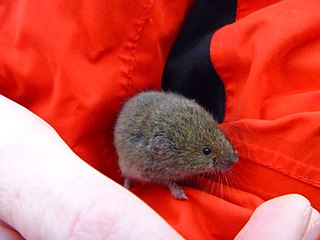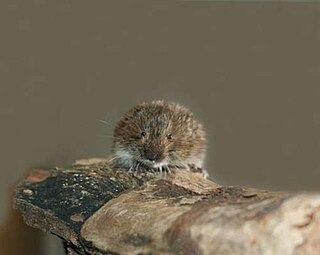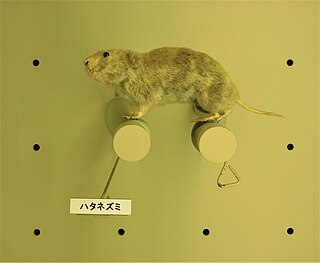
Microtus is a genus of voles found in North America, Europe and northern Asia. The genus name refers to the small ears of these animals. About 62 species are placed in the genus. They are stout rodents with short ears, legs and tails. They eat green vegetation such as grasses and sedges in summer, and grains, seeds, root and bark at other times. The genus is also called "meadow voles".

The Bavarian pine vole is a vole from the Austrian, Italian, and Bavarian Alps of Europe. It lives in moist meadows at elevations of 600 to 1,000 meters. There are 23 museum specimens of this species. This rodent was previously known to live in only one location, Garmisch-Partenkirchen in Bavaria, which was altered by the construction of a hospital in the 1980s. No specimens of this rodent were recorded after 1962 and it was thought to be extinct. However, a population apparently belonging to this species was discovered in 2000 in Northern Tyrol, just across the German-Austrian border. An Austrian scientist, Friederike Spitzenberger, stumbled upon the species in a live trap. Its species status was confirmed by genetic studies, and it was found to be very closely related to Liechtenstein's vole from the Eastern Alps. Further research is required to determine the size and range of the population and the species has been re-assessed as Critically Endangered by the IUCN.

The rock vole is a medium-sized vole found in eastern North America. It is also called the yellow-nosed vole.

Abies guatemalensis, the Guatemalan fir or pinabete, is an evergreen tree native to Central America and is the southernmost member of the genus Abies being spread to the south lower than 14° N. Its range is from southern Mexico in the north to Honduras and El Salvador in the south. It is a warm-loving and moisture-loving tree of the tropical mountain coniferous and mixed cloud forests of these countries. The Guatemalan fir is an almost completely non-frost-resistant tree. Due to logging and loss of habitat, the tree is considered threatened and is protected in CITES Appendix I.

The Tatra pine vole, also called the Tatra vole or Tatra ground vole, is a species of vole endemic to the Carpathian mountain range in Slovakia, Poland, Ukraine and Romania. Two subspecies have been recognised. M. t. tatricus occupies the western part of the range in Slovakia and Poland, and M. t. zykovi is found in Ukraine and Romania.
The Daghestan pine vole is a species of rodent in the family Cricetidae. It is found in Russia, Georgia, Armenia, and Azerbaijan.
Gerbe's vole is a species of rodent in the family Cricetidae found in France and Spain.
The Mongolian vole is a species of rodent in the family Cricetidae. It is found in China, Mongolia, and Russia.

The Japanese grass vole is a species of rodent in the family Cricetidae. It is found only in Japan.
The Muisk vole is a species of rodent in the family Cricetidae. It is found only in Russia.
The alpine pine vole is a species of rodent in the family Cricetidae. It is found in Austria, France, Italy, Serbia, Montenegro, Bosnia and Herzegowina and Switzerland.

The East European vole is a species of vole (rodent) in the family Cricetidae.

Savi's pine vole is a species of rodent in the family Cricetidae. It is found in France and Italy.

The European pine vole, also known as the common pine vole, is a species of rodent in the family Cricetidae. It is native to much of Europe and parts of Asia.
The Guatemalan deer mouse is a species of rodent in the family Cricetidae. It is found in Guatemala and Mexico.
Clarke's vole is a species of rodent in the family Cricetidae. It is found only in China.

The Taiwan vole is a species of rodent in the family Cricetidae, It is an endemic species of Taiwan. This species is herbivorous with a preference for the Yushan cane.

Plectrohyla guatemalensis, also known as the Guatemala spikethumb frog, is a species of frog in the family Hylidae. It occurs in the highlands of the Sierra Madre from southeastern Chiapas, Mexico, and eastward through the central and southwestern highlands of Guatemala to northwestern El Salvador as well as the Sierra de Nombre de Dios in north-central Honduras. It might be a composite of more than one species.
The Anatolian vole is a species of vole found in Turkey, specifically Konya Province. The population is unknown but it lives in small colonies. The species exists in an area that is a remnant zone of Tethys Ocean, and this area is being increasingly exploited for sugar beet cultivation. Other related threats include irrigation and rodenticides from the sugar beet cultivation. The eastern range may be protected by Lake Tuz Special Protected Area but this area is not well protected and has been deteriorated.

Pitymys is a subgenus of voles in the genus Microtus. Species in this subgenus are:












